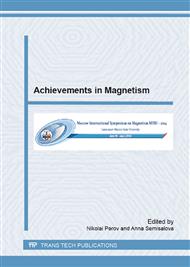p.101
p.105
p.109
p.113
p.117
p.121
p.125
p.129
p.133
Magneto-Electronic Phase Separation in La0.7Sr0.3MnO3 with Metallic Behavior in Paramagnetic Region
Abstract:
The data on transport and magnetic properties (ac linear and nonlinear (second and third orders) susceptibilities) are presented for La0.7Sr0.3MnO3 single crystal with metallic behavior in paramagnetic (PM) region and ferromagnetic (FM) metallic ground state. The FM clusters originate in the PM matrix of the compound below some temperature T* > 425 K, their nonlinear response being weakly T-dependent down to 367 K. This was attributed to clusters arising in the preferable sites formed by chemical inhomogeneities introduced by doping. On cooling below T# ≈ 366 K > TC ≈ 363.3 K, a fast growth of cluster response without the change of its parameters is observed that was attributed to the development of homogeneous nucleation of the FM clusters. The latter stage continues below TC and is accompanied by a crossover to the steeper decreasing of resistivity with cooling that suggests metallic properties of the clusters. The cluster nonlinear response masks completely that of matrix at T = 360.3 K < TC, where it is well described by the model of ensemble of magnetic single-domain nanoparticles in superparamagnetic regime based on the formalism involving Gilbert-Landau-Lifshits equation. Below TD = 359.6 K at the stage of domain formation, a weak interaction of matrix and cluster subsystems leads to their mutual ordering, which is accompanied by a sharp decrease of the nonlinear response to a weak ac field in small steady field H. The latter suggests an “antiferromagnetic” type of arrangement of these subsystems that provides decreasing the magnetostatic energy of the sample.
Info:
Periodical:
Pages:
117-120
Citation:
Online since:
July 2015
Price:
Сopyright:
© 2015 Trans Tech Publications Ltd. All Rights Reserved
Share:
Citation:


